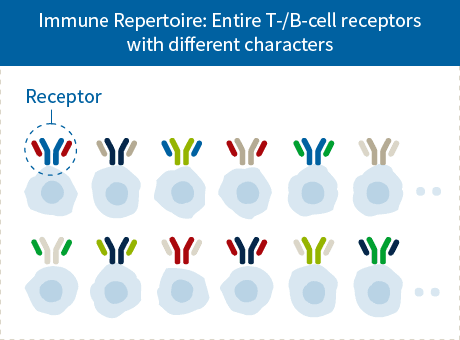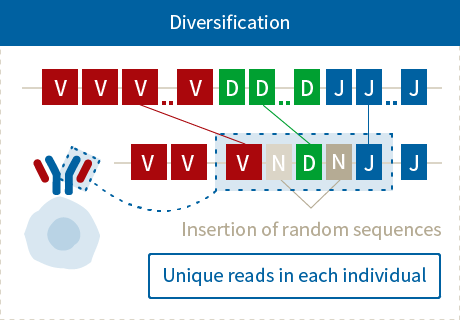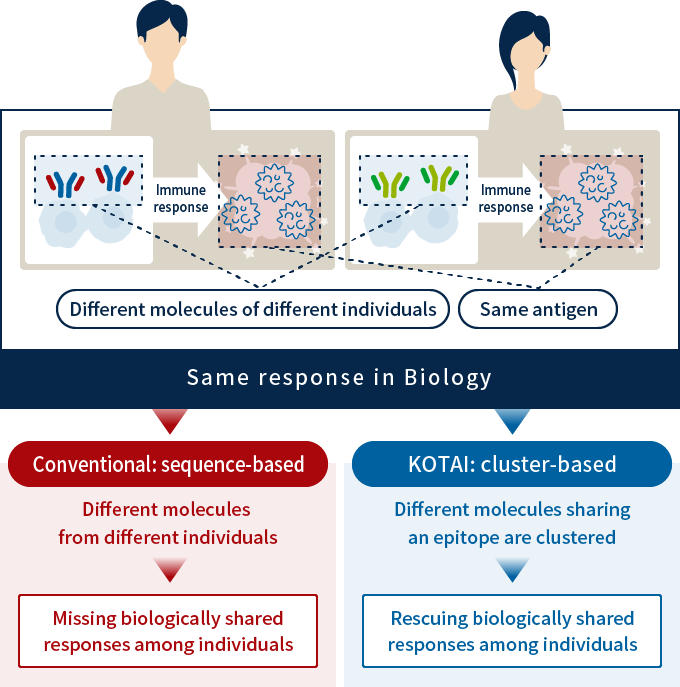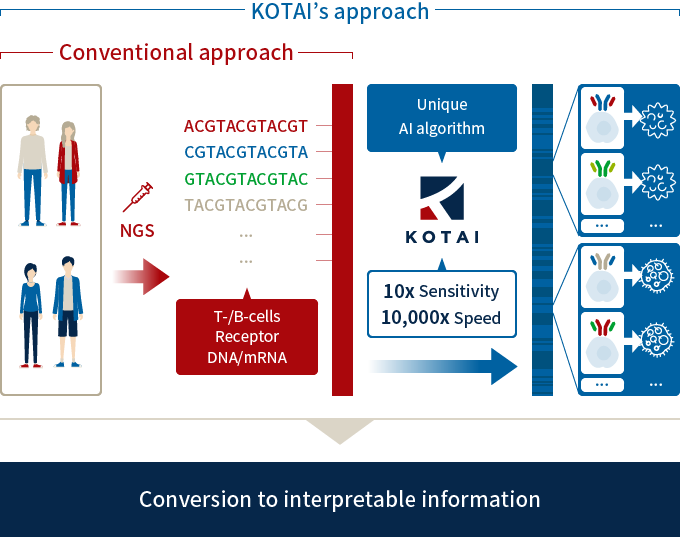- What is immune repertoire?
- Possibility of immune repertoire analysis
- Challenges of immune repertoire analysis
- KOTAI’s Technology and Strengths
- Target diseases
What is immune repertoire?
T cells and B cells that form lymphocytes are the major players in the acquired immune response, and it is one of their characteristics that T / B cell receptor (TCR / BCR), antigen awareness molecules, are expressed on its surface. These receptors allow the immune system to respond antigen-specifically. Immune repertoire means the total of these TCR / BCR.

TCR / BCR is known to be created by a unique mechanism called V (D) J gene reconfiguration, a research that Dr. Susumu Tonegawa won the Nobel Prize in Physiology and Medicine. This mechanism selects and combines one gene each from the V, D, and J gene groups to reform a single receptor molecule. In addition, the inclusion of moldless sequences called N sequences between these genes creates a vast variety of 1012.

Possibility of immune repertoire analysis
TCR/BCR, which constitutes immune repertoire, has high antigen specificity, and T/B cells can also store antigens encountered once by immune memory over a long period of time. This nature is a very promising for biomarkers. In other words, it contains information on what antigens have been experienced, what kind of response they are now responding to, and what they are preparing for, and many applications are expected, such as diagnosis, prognosis, and drug efficacy prediction.
In addition, cancer-specific T/B cells may become drugs such as T cell therapy and antibody medicines, and it is expected that large amounts of human immune data can be analyzed to find drug discovery targets and drug candidates.

Challenges of immune repertoire analysis
Immune repertoire has acquired antigen specificity due to its vast diversity, but due to its diversity, it has significant problems in data analysis. V(D) J gene reconfiguration is a constantly repeated process in individuals, and the receptor sequences generated and obtained as data are rarely shared between individuals (<1%).
However, the immune response to the same antigen is certainly occurring, which means that molecules with different sequences are responding to the same antigen (epitope) between individuals. In other words, despite the response to the same antigen (epitope), the corresponding receptor sequence data is different between individuals and does not appear to cause the same response on the data.
In other words, the same antigen may be recognized even if the receptor sequence is different, so the need for predicting the three-dimensional structure and specificity of the receptor using AI technology has become clear.
KOTAI’s Technology and Strengths
We have overcome this problem and developed an AI algorithm that clusters (= equates) TCR/BCR that recognizes the same antigen epitope. This allows the antigen epitope to be linked to TCR/BCR, allowing us to fully utilize the usefulness of immune repertoire.

The algorithm is also at the top of the world in sensitivity and speed, allowing you to search for statistically significant clusters from small patient groups such as rare diseases and analyzing large cohorts of thousands of people.
Since these results are created from very unique algorithms, the biomarkers and drug discovery targets identified are expected to be highly novel.
Target diseases
We are focusing on the field of cancer and autoimmune diseases. In addition, we are conducting researches in the field of infectious diseases under the grants from Japan Agency for Medical Research and Development (AMED).
